Decoding the Modern Job Seeker: A Data-Driven Guide for Recruiters
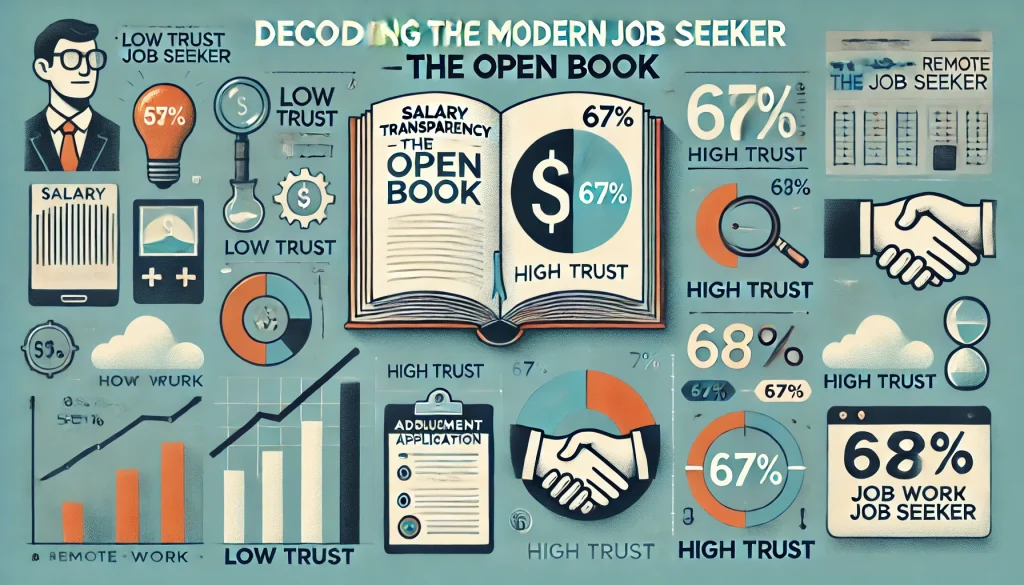
The landscape of talent acquisition is in constant flux, shaped by evolving candidate expectations and a rapidly changing world of work. To effectively attract, engage, and secure top talent in today’s competitive market, recruiters and hiring managers must move beyond traditional practices and deeply understand what truly motivates and influences modern job seekers. This article delves into the key expectations driving candidate decisions, backed by compelling data that underscores the urgency for organizations to adapt. By understanding these nuances across salary transparency, remote work preferences, the significance of company culture, and the pivotal role of a positive candidate experience, businesses can craft more effective recruitment strategies and build a workforce fit for the future.
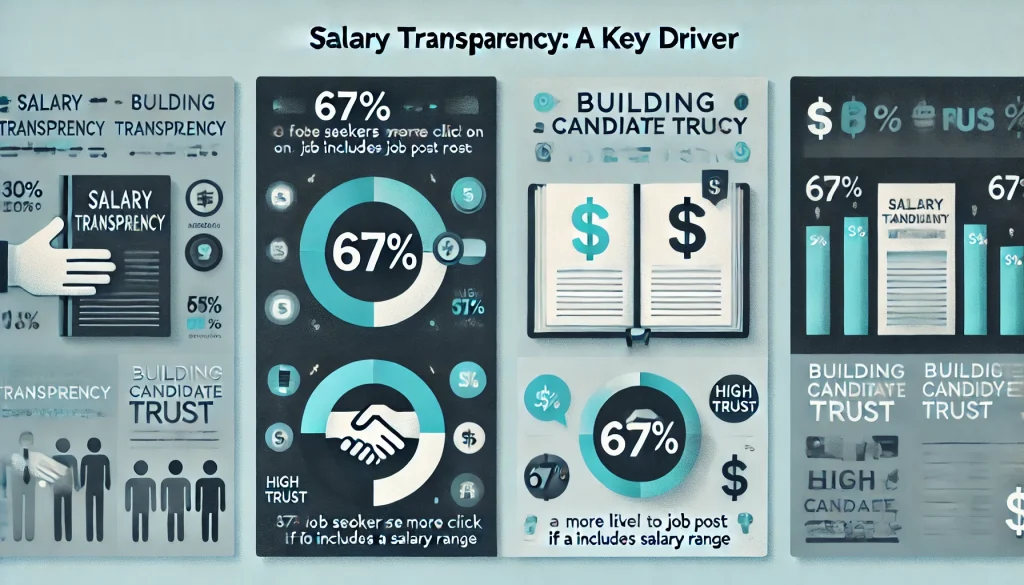
Section 1: Salary Transparency – The Open Book: Building Trust and Attracting Applicants
The era of shrouded compensation is rapidly fading. Today’s job seekers demand clarity and openness when it comes to salary information, viewing it as a fundamental aspect of respect and fairness. Data unequivocally supports this shift, highlighting the significant impact of salary transparency on application rates and candidate trust.
According to the Appcast 2023 Recruitment Marketing Benchmark Report, a remarkable 67% of job seekers are more likely to click on a job post if it includes a salary range. This statistic underscores a fundamental change in job search behavior. Candidates are no longer willing to invest time and effort in applications where the salary remains a mystery. Disclosing the salary range upfront not only saves candidates time but also signals an employer’s honesty and confidence in their compensation practices. By providing this crucial information, companies can significantly increase the visibility of their job postings and attract a wider pool of qualified applicants who align with the stated compensation.
Furthermore, the desire for salary transparency extends beyond mere curiosity. It’s deeply intertwined with building trust between potential employees and employers. A Bequest Q4 2023 survey of 1000 workers in the US revealed that 79% of employees want to work for a company that values pay transparency. This sentiment reflects a growing expectation for openness and equity in the workplace. When employers are upfront about compensation, it fosters a sense of trust and credibility, signaling a commitment to fair practices. Conversely, a lack of transparency can breed suspicion and lead candidates to believe that the company may not be offering competitive or equitable pay. This erosion of trust can be a significant deterrent, causing talented individuals to look elsewhere for opportunities where compensation is discussed openly and honestly.
The benefits of salary transparency extend beyond attracting initial interest and building trust; they also translate into tangible results for companies. While a specific widespread statistic on a direct percentage increase in overall application rates is still emerging, the Society for Human Resource Management (SHRM) unequivocally states that pay transparency can lead to more (and better) job applicants. When companies disclose salary information, they are not only attracting a larger volume of applications but also potentially attracting candidates who are genuinely interested in the role and whose salary expectations align with the offered range. This pre-screening effect can save recruiters valuable time and resources by reducing the number of unqualified or misaligned applicants. Moreover, transparency can contribute to a more efficient hiring process, as salary negotiations are likely to be smoother and faster when candidates have a clear understanding of the compensation from the outset.
In conclusion, the data clearly indicates that salary transparency is no longer a “nice-to-have” but a crucial element of a modern recruitment strategy. By embracing openness in compensation discussions, companies can enhance their job posting visibility, build stronger trust with potential employees, and ultimately attract a larger and more qualified pool of talent.
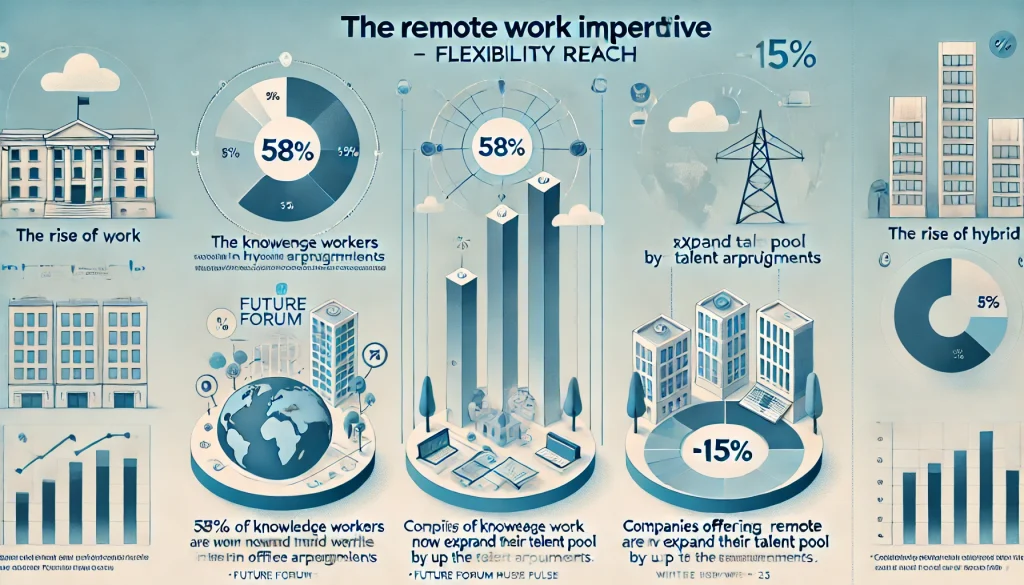
Section 2: The Remote Work Imperative – Flexibility is Key to Attracting Modern Talent
The COVID-19 pandemic irrevocably shifted perceptions and preferences regarding the traditional workplace. Remote and hybrid work models have moved from being niche perks to becoming fundamental expectations for a significant portion of the modern workforce. The data overwhelmingly demonstrates that flexibility in work arrangements is a powerful magnet for attracting and retaining talent.
The Future Forum Pulse, Winter 2023 Snapshot, provides a compelling glimpse into the current state of work, revealing that 58% of knowledge workers are now working in hybrid arrangements. This statistic highlights the widespread adoption of flexible work models and the growing comfort and preference for a balance between remote and in-office work. This preference is driven by numerous factors, including the desire for greater work-life balance, reduced commute times and costs, and increased autonomy and control over one’s work environment. Organizations that fail to acknowledge and accommodate this preference risk alienating a significant portion of the talent pool who actively seek out roles that offer flexibility.
Furthermore, offering remote work options can dramatically expand a company’s reach in the talent market. Robert Half reports that companies offering remote work options can expand their talent pool by up to 15% by not being constrained by a local market. This is a significant advantage in today’s competitive landscape, where finding candidates with specialized skills can be challenging within a limited geographical area. By embracing remote hiring, companies can tap into a nationwide or even global talent pool, gaining access to a more diverse and highly skilled workforce that they might otherwise miss. This expanded reach can be particularly crucial for organizations seeking niche expertise or looking to build a more diverse and inclusive workforce that reflects a wider range of perspectives and experiences.
The sheer demand for remote work opportunities is further underscored by data on job seeker behavior. According to ZipRecruiter data, as reported by CNBC, “Remote” job postings receive 3x more applications than those requiring full-time in-office work. This staggering statistic speaks volumes about the current priorities of job seekers. The overwhelming preference for remote roles indicates that companies that do not offer flexible work arrangements are at a significant disadvantage in attracting candidates. Job seekers are actively searching for and prioritizing remote opportunities, and companies that fail to offer them are effectively limiting their visibility and appeal to a vast segment of the talent market. This disparity in application volume highlights the critical need for organizations to re-evaluate their work models and consider incorporating remote or hybrid options to remain competitive in the war for talent.
In conclusion, the data paints a clear picture: remote and hybrid work are no longer fringe benefits but core expectations for a substantial portion of the modern workforce. Companies that embrace flexibility in work arrangements can tap into a wider talent pool, attract significantly more applicants, and ultimately position themselves as more desirable employers in today’s evolving world of work.
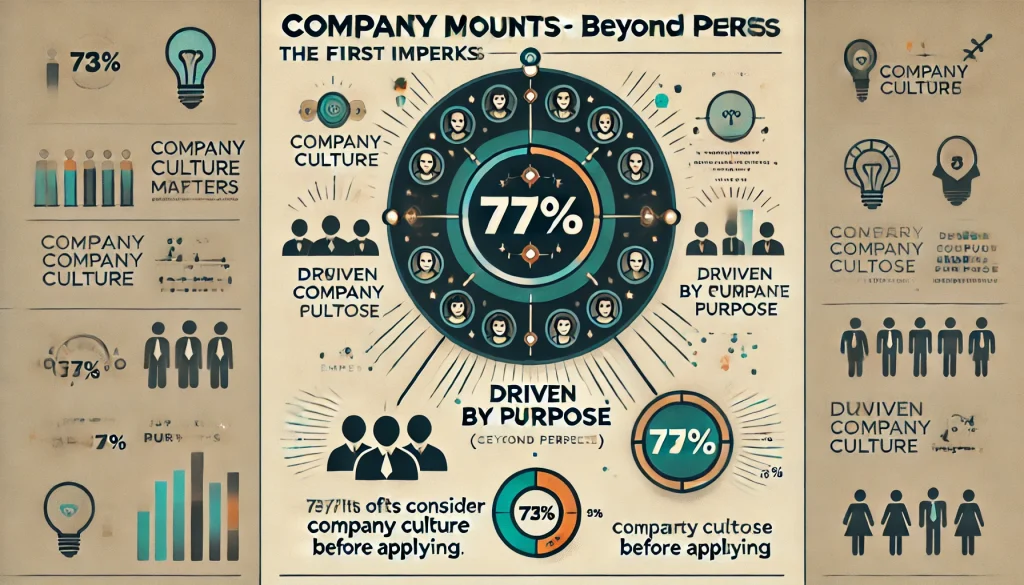
Section 3: Company Culture Matters – Beyond Perks: Attracting Talent Through Values and Purpose
While compensation and work flexibility are crucial factors in candidate decision-making, the importance of company culture has risen significantly in recent years. Modern job seekers are increasingly discerning, looking beyond superficial perks to understand the underlying values, purpose, and overall work environment of potential employers. Data reveals that a strong and positive company culture is a powerful differentiator in attracting and engaging top talent.
A Glassdoor survey, consistently cited in various articles, indicates that a substantial 77% of adults consider a company’s culture before applying for a job. This statistic highlights the critical role that culture plays in the initial stages of the candidate journey. Job seekers are actively researching and evaluating potential employers based on their perceived culture, often looking at online reviews, employee testimonials, and the company’s stated values. A negative perception of a company’s culture can be a significant deterrent, even if the compensation and job responsibilities are appealing. This underscores the need for organizations to not only cultivate a positive internal culture but also to effectively communicate that culture to potential candidates.
Furthermore, modern job seekers are increasingly driven by a sense of purpose and a desire to work for organizations whose values align with their own. The 2022 Edelman Trust Barometer Special Report: The New Cascade of Influence found that a remarkable 73% of employees who say they work at a “purpose-driven” company are engaged, compared to a mere 23% of those who don’t. While this statistic focuses on employee engagement, it strongly implies that candidates are also drawn to organizations with a clear sense of purpose and a commitment to making a positive impact. Companies that can articulate their mission and values effectively and demonstrate a genuine commitment to them are more likely to attract candidates who are not only skilled but also passionate and aligned with the organization’s goals. This alignment can lead to higher levels of job satisfaction, engagement, and ultimately, retention.
The impact of a strong company culture extends beyond attracting and engaging employees; it also has a tangible impact on business outcomes. Forbes, referencing a long-term study, reports that strong company culture can increase revenue growth by 4x. While this statistic is based on research conducted over several years, the underlying principle remains highly relevant. A positive and cohesive culture fosters collaboration, innovation, and employee commitment, all of which contribute to improved productivity and financial performance. Companies that invest in building and nurturing a strong culture are not only more attractive to potential employees but also more likely to achieve long-term success.
In conclusion, the data clearly demonstrates that company culture is a critical factor influencing the decisions of modern job seekers. Organizations that prioritize building a positive, purpose-driven culture and effectively communicate their values are more likely to attract engaged and aligned talent. Furthermore, a strong culture is not just a recruiting advantage but also a key driver of employee engagement, retention, and ultimately, business success.
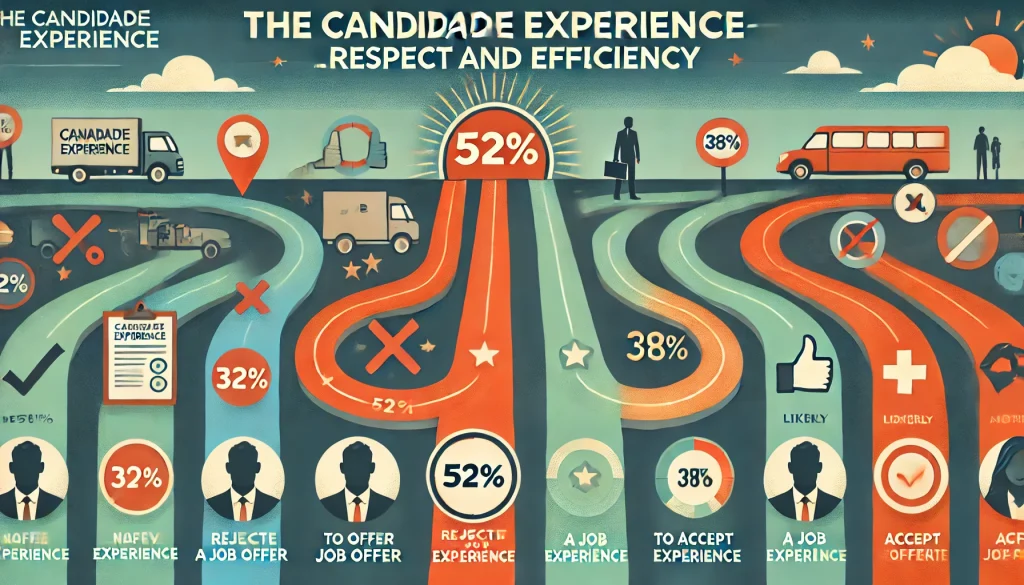
Section 4: The Candidate Experience – Respect and Efficiency: Leaving a Lasting Positive Impression
In today’s interconnected world, the candidate experience has become a crucial aspect of employer branding and talent acquisition. How a candidate is treated throughout the recruitment process, from initial application to final outcome, can significantly impact their perception of the company and their willingness to accept an offer or even recommend the organization to others. Data reveals that a negative candidate experience can lead to lost opportunities and damage a company’s reputation, while a positive experience can be a powerful tool for attracting and securing top talent.
A CareerArc study, frequently cited in discussions about candidate experience, highlights the significant consequences of a poor recruitment process, stating that 52% of job seekers cite a negative candidate experience as their reason for rejecting a job offer. This statistic underscores the direct impact of the candidate experience on hiring outcomes. Even if a candidate is initially interested in a role, a frustrating or disrespectful recruitment process can quickly turn them off and lead them to decline an offer. Negative experiences can include factors such as lack of communication, lengthy and cumbersome application processes, unprofessional interviewers, and a general lack of respect for the candidate’s time. In today’s transparent digital environment, these negative experiences can easily be shared online, further damaging the company’s employer brand and making it more difficult to attract future talent.
Conversely, a positive candidate experience can significantly increase the likelihood of offer acceptance. Research from the IBM Smarter Workforce Institute (while foundational, still relevant) suggests that candidates who have a positive experience are 38% more likely to accept a job offer. This statistic highlights the powerful influence of a positive recruitment journey. When candidates feel valued, respected, and well-informed throughout the process, they are more likely to develop a positive perception of the company and be enthusiastic about joining the team. A positive experience can differentiate an employer in a competitive market and make them a more attractive option for top talent who may be considering multiple offers.
Furthermore, the candidate experience is increasingly viewed as a reflection of a company’s overall values and how it treats its people. According to CareerBuilder, 78% of candidates say the overall candidate experience they receive is an indicator of how a company values its people. This perception has significant implications for employer branding. A positive and respectful candidate experience signals that the company values its employees and treats individuals with consideration. Conversely, a negative experience can create the impression that the company is disorganized, disrespectful, or doesn’t value its workforce. In an era where employer reputation is paramount, providing a positive candidate experience is not just about filling open roles; it’s about building a strong employer brand that attracts talent and fosters long-term relationships.
In conclusion, the data clearly demonstrates that the candidate experience is a critical element of modern recruitment. Organizations that prioritize creating a positive, respectful, and efficient recruitment process are more likely to secure top talent, enhance their employer brand, and ultimately build a stronger and more engaged workforce. Neglecting the candidate experience, on the other hand, can lead to lost opportunities, damage reputation, and hinder future recruitment efforts.



